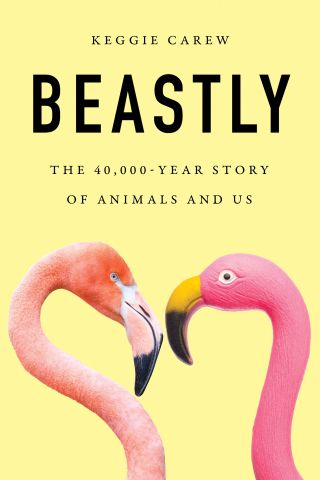Relationships
Beastly: The Entangled History of Animals and Us
Review: Keggie Carew's new book explores human-animal relationships.
Updated July 18, 2023 Reviewed by Tyler Woods

I've long been interested in the evolution of human-nonhuman (animal) relationships and reading award-winning nature writer Keggie Carew's newest book Beastly: The 40,000-Year Story of Animals and Us was not only a pleasure to read but also deeply informative about the ongoing nature of the myriad ways we have interacted with other animals. Part of the book's description captures the essence of this must-read: "Beastly, tracks the 40,000-year story of our changing kinship with the animal world—through history, culture, science, and our most revealing encounters. It makes the case that animals are the key to the planet’s health, but only if we can save them...Beastly is a gorgeously written, deeply researched, and intensely felt journey into the splendor and genius of animals and the long, complicated story of our interactions with them as humans."
Here's what Keggie had to say about her landmark book.
Marc Bekoff: Why did you write Beastly?
Keggie Carew: I was anxious. About climate change, pollution, pandemics, biodiversity loss, soil degradation. We were in trouble and we were being told...but we weren’t listening. I wanted to unravel how on earth we got here. Why were we destroying the ecosystems on which we depend? All roads led back to the same thing: our relationship with the planet’s other inhabitants. Because animals build and maintain the ecosystems that give us oxygen, food, and clean water, while taking the carbon dioxide away—for free! They replenish the nutrients, sort out the hydrology, build the soil, clean the water, seed the clouds. Our relationship with them is the most important on the planet, from the smallest microbe to the largest animal that ever lived, because only with their presence can ecosystems function; in their absence, ecosystems fall apart. To relearn how to coexist with wildlife and safeguard their homes, their food, and their prospects, we needed to understand why, so I felt compelled to tell this story. Then I was sent an extraordinary photograph of a boar and a girl sharing bread, the clock read twelve, and a candelabra was precariously alight. It was like a parable, and I couldn’t turn back.

MB: Who is your intended audience?
KC: Politicians! Policymakers. Educators. Salesclerks. Gardeners. the USDA, the Idaho and Wyoming Departments of Fish and Wildlife. Your uncle, my aunt. My neighbor. Your niece. Grandpa. Mum and Dad. The delivery man. Farmers. All of us. I wanted to get this subject out of its echo chamber. To communicate this story in a way that is relevant and fascinating to everyone. There’s a group the publishing trade calls "the information seekers", they read books on history, politics, economics. I want them, too. “If you are interested in the animal kingdom; if you are interested in the past, present, and future of planet Earth; if you are interested in anything at all—then this gorgeous, joyous, sobering book is for you.” Well, that was very nice to hear! If we understood our animal cousins as the individuals they are, alongside the ecological roles they play, humans would not be doing what they do to them.
MB: What are some of the topics you weave into your book and what are some of your major messages?
KC: Beastly tracks the 40,000-year story of our changing kinship with animals—from the cave painters to now. My guides are the extraordinary humans who have stepped closely into a myriad of animal worlds. For, amongst the many paradoxes, no other animal forms as deep attachments across the species divide as we do.
How, from our mammoth hunting days, our relationship with animals began to change the face of the planet. How farming sowed the seeds of a 12,000-year war against nature. How we ordered the natural world into a hierarchy, a narrowing ladder that got warmer and better all the way up to us. How stories and language have shaped (and misshaped) the way we think about animals. It's not surprising we became separated from the interrelated community of which we are part. For centuries, animals were perceived to be clueless, without feeling or even consciousness.
Since 20th-century ethologists began to study animals in their natural environments, the discoveries of animal ability, intelligence, and sentience continue to dazzle us. A diver watches a cuttlefish flash a rippling cloud on her right side to another cuttlefish, while her left side remains camouflaged. What was she saying? We are having to change our minds not just about cephalopods but many creatures.
Beastly explores the wonders of the natural world as an endless fascinating theatre of life whose ecological dynamics we are dependent on. How, for instance, great whales increase marine life, and how their return could significantly mitigate climate change.
Across the globe, initiatives to restore ecosystems and return wildlife to their historic homes are multiplying. In the Galapagos Islands, the Española giant tortoise, once in their thousands, were down to 15 individuals by 1960, due to vast numbers of feral goats destroying their habitat. After a successful 55-year breeding program with those 15 tortoises brought into captivity, and the removal of the feral goats, there is now a wild population of more than 2,300. But how about this: in 2020 the original 15 adults who saved their species from extinction were returned to their island, by tractor-trailer, then boat, then backpacked like colossal Stone Age coracles by 15 humans to the interior to join their offspring and live out their long lives. We are the gods…
Only through deeper understanding can we mend our relationship with the creaturely world. Animals are the key. There is no technology at scale that can do what animals have been doing for millennia. Animals could save us. The paradox is, now, only we can save them.
MB: Are you hopeful that as people learn more about the importance of coexistence with other animals they will treat them with more respect and dignity?
KC: Yes! That’s exactly why I spent five years writing this book. No other reason. Apart from saving the planet. So, thank you, Marc, for inviting me to your Psychology Today site.
References
In conversation with Keggie Carew, who won the 2016 Costa Biography Award for her shape-shifting memoir, Dadland.
1) The book's description reads: Animals have shaped our minds, our lives, our land, and our civilization. Humanity would not have gotten very far without them—making use of their labor for transportation, agriculture, and pollination; their protection from predators; and their bodies for food and to make clothing, music, and art. And over the last two centuries, humans have made unprecedented advances in science, technology, behavior, and beliefs. Yet how is it that we continue to destroy the animal world and lump its magnificence under the sterile concept of biodiversity? In Beastly, author Keggie Carew seeks to re-enchant readers with the wild world, reframing our understanding of what it is like to be an animal and what our role is as humans. She throws readers headlong into the mind-blowing, heart-thumping, glittering pageant of life, and goes in search of our most revealing encounters with the animal world throughout the centuries. How did we domesticate animals and why did we choose sheep, goats, cows, pigs, horses, and chickens? What does it mean when a gorilla tells a joke or a fish thinks? Why does a wren sing? Beastly is a gorgeously written, deeply researched, and intensely felt journey into the splendor and genius of animals and the long, complicated story of our interactions with them as humans.
The Importance of Building Enduring Human-Animal Bonds; Human-Animal Relationships: Power, Justice, and Fairness; An Avian Epiphany: How Relationships With Birds Made Us Human; Kindred Spirits: Transformative Human-Animal Relationships; What Happened After Human Carnivores Came to America' Why There's Hope for the Survival of Strong-Willed Beasts.


